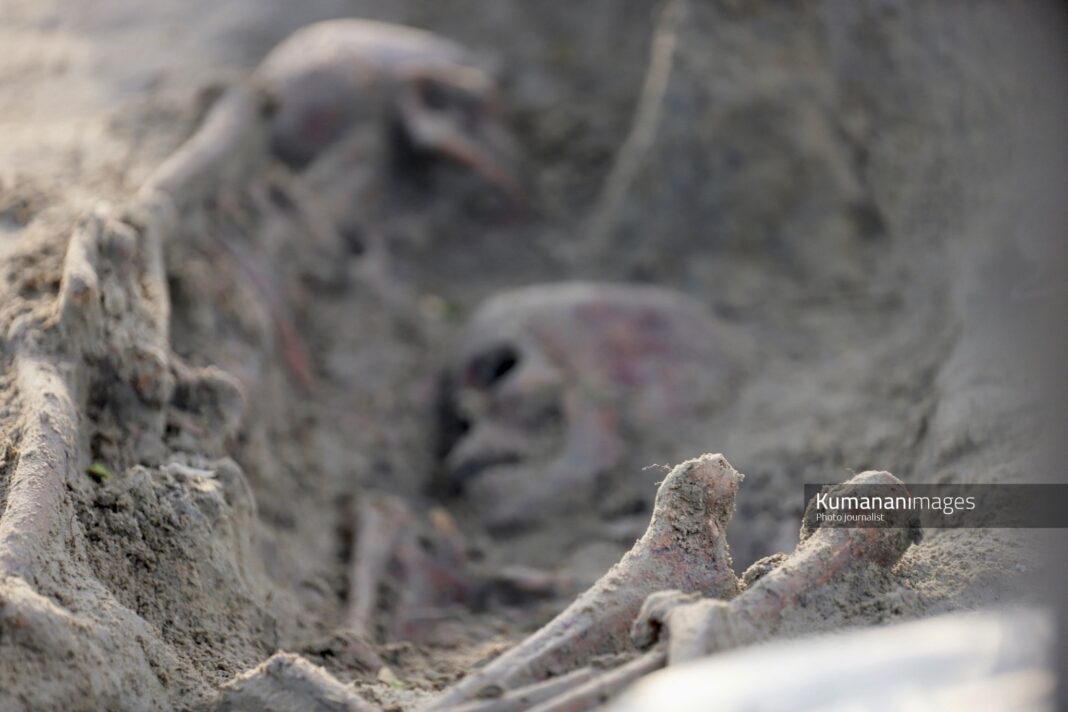Image credit:@kumanan
In its letter to President Anura Kumara Dissanayake, the ITKA underscores that the excavations at the Chemmani mass grave—alongside several other mass graves discovered in Tamil-majority areas of the North and East—constitute compelling evidence of war crimes and a genocidal campaign against the Tamil population. This deeply troubling history, ITKA stresses, must be fully acknowledged.
The letter:
11th July 2025
His Excellency Anura Kumara Dissanayake
President of the Democratic Socialist Republic of Sri Lanka
Colombo
The Imperative of Truth Seeking, International Collaboration, and Justice in the Chemmani Mass Grave Investigation
Your Excellency,
We write on behalf of Ilankai Thamil Arasuk Katchi to express profound concern regarding the on-going exhumation at Chemmani. We urge urgent and decisive action to uncover the truth, ensure forensic protocols meet internationally recognized standards, and bring perpetrators to justice.
Chemmani has come to represent Sri Lanka’s unresolved legacy of enforced disappearances and extrajudicial killings extending into the mid-1990s. In 1998, Lance Corporal Somaratne Rajapakse convicted for the rape and murder of Tamil schoolgirl Krishanthi Kumaraswamy and family members, revealed at his sentencing hearing that between 300 and 400 Tamil civilians had been buried there.
This disclosure prompted excavations in 1999 that yielded fifteen skeletons, two of which were identified as disappearances from 1996. Despite forensic confirmation of assault and execution, prosecutions stagnated and no meaningful justice was delivered to this day.
In early 2025, during redevelopment work at the Chemmani Ariyalai Siththuppaththi Hindu crematorium in northern Jaffna, human skeletal remains were uncovered, prompting the Jaffna Magistrate’s Court to formally declare the site a mass grave and order a court-supervised excavation under judicial supervision.
As of today, approximately 65 skeletons including infants and children had been exhumed in two phases,accompanied by personal artefacts such as a schoolbag, toy, bangles, sandals and fragments of clothing. All remains are held at the University of Jaffna for forensic examination.
These excavations, along with several other mass graves in the Tamil areas of the North-East, constitute clear evidence of war crimes and a genocidal campaign against the Tamil population in this country, a grave history that must be acknowledged in full.
Truth seeking must serve as the foundation of any transitional justice process. Hundreds of families continue to seek answers, more than sixteen years after the war ended in 2009. These families are asking an imperative question about the fate of their missing loved ones. The silence of successive regimes is not merely a political failure but a grave moral one. Every year without truth undermines the possibility of national healing and closure.
The fifteen bodies removed in 1999 are clearly connected to the same criminal context as the current discoveries. However, the pending case in the Colombo Magistrate’s Court relating to that excavation has not been formally integrated with the present investigation. These must now be treated as part of a single criminal transaction. Only the consolidation of both investigations can enable meaningful accountability.
Sri Lanka’s limited domestic forensic capacity and the history of opaque handling of mass graves make transparent protocols and credible international oversight indispensable. Chain of custody must be documented meticulously. Independent forensic experts of recognized international standing should be engaged to oversee excavation, identification and analysis. Interim and final reports must be publicly disclosed to victims’ families, civil society, international observers and the wider public.
It has come to light that the fifteen bodies exhumed in 1999 were reportedly transferred to the University of Glasgow for analysis. To date, successive Sri Lankan governments have taken no meaningful steps to repatriate those remains, identify the victims or facilitate their proper last rites.
Those remains must be urgently returned to Sri Lanka so they may be reinvestigated under the same internationally monitored protocols applied to the current Chemmani excavation contributing to a unified and coherent truth-seeking process.
The Earth at Chemmani is speaking again. Over forty skeletons, including infants, have emerged with personal artefacts that painfully affirm their civilian status and innocence. Yet many perpetrators remain at liberty. Symbolic gestures of reconciliation ring hollow without real legal action.
We therefore respectfully but firmly urge Your Excellency to implement the following without delay:
1. Consolidate the legal cases related to the 1999 and 2025 exhumations into a single judicial and forensic inquiry under the Colombo and Jaffna Magistrate’s Courts.
2. Engage independent, internationally respected forensic experts to oversee all stages of the investigation, ensuring forensic integrity and public trust.
3. Publicize all interim and final forensic reports, DNA profiles and identification results, and facilitate access for victims’ families, civil society and international observers.
4. Repatriate the remains excavated in 1999, currently believed to be held in Glasgow, so they may be examined under the same protocols and returned to their families with dignity.
5. Allocate significantly enhanced financial and logistical resources to ensure that the current excavation is completed under international standards; hundreds of families continue searching for missing loved ones, and without truth and accountability, reconciliation remains a facade.
Concurrently, take steps to prosecute those responsible for these heinous crimes, which is essential for national healing.
These actions are essential to uphold Sri Lanka’s moral and legal obligations and to chart a credible path toward truth and justice.
We remain ready to support constructively in facilitating these measures and ensuring their timely
implementation.
Yours Sincerely
C.V.K. Sivagnanam
M. A. Sumanthiran
